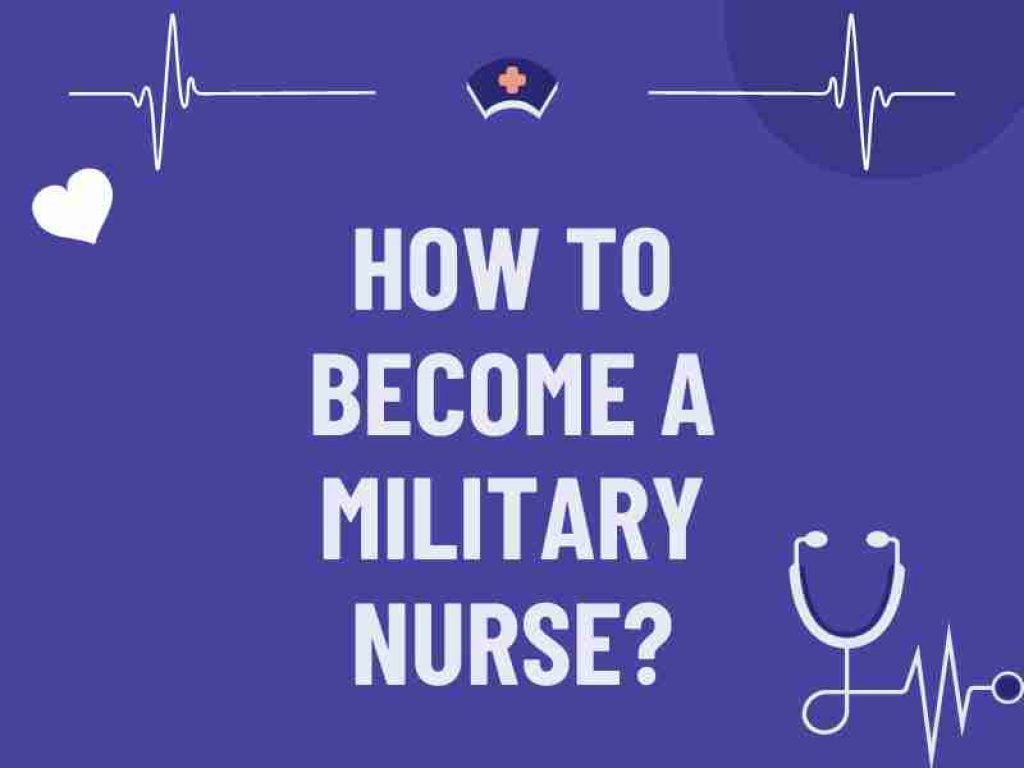
How To Become A Military Nurse?
Are you interested in providing humanitarian aid while protecting and carrying out duties for the nation in different parts of the world? than this article is a good helpful source for military life.
What is a Military Nurse?
The term “military nurse” refers to a registered nurse who serves in the armed forces and has received additional training to care for patients in military clinics and hospitals and in temporary medical facilities set up in dangerous areas.
A military caregiver may assist active duty people, veterans, or the families of those who have served. Military nurses are obligated to serve for a minimum of three years in exchange for compensation, housing allowances, assistance with educational costs, and retirement plans.
To meet the unique needs of patients at military medical facilities, the military employs registered nurses under contract. Military nurses provide pre-and post-operative care and infection surveillance for service members, much like military registered nurses do for civilians.

Military nurses not only get the opportunity to tour the world but also have access to top-notch training and receive financial support for their academic pursuits. They have access to a number of perks, including free medical healthcare. Military nurses are also responsible for ensuring their patients are free from pain and suffering, helping those who are disabled to care for themselves, and giving emotional and psychological support.
In times of relative calm, military nurses tend to focus on providing care to serving members of the armed forces and their families. They may even treat civilians in need during times of healthcare. In contrast, military nurses provide critical health care in conflict areas and near the battle lines. A nursing career in the military may be incredibly hard and emotional. It’s also potentially risky, as military nurses are often sent with combat troops overseas.
What duties does a Military Nurse have?
This is not your traditional role for a registered nurse, so you’ll need to be ready to jump in and help out. You can only begin to fathom the demands placed on nurses daily when you consider the need to think critically under pressure, respond quickly and effectively in an emergency, and keep everyone calm in the face of a crisis.
Taking all that and doing it in a military situation, especially during combat missions, is daunting. There’s no denying that a career as a military nurse is demanding, but it also offers tremendous rewards. You’ll never be bored in the military, and your duties may vary greatly depending on the branch you choose. Depending on the needs of your service, you may have to travel both in the United States and abroad as a nurse.
Military nurses are available for deployment in the event of an emergency. No matter your assignment, you’ll be dealing with delicate situations that always demand your highest care and expertise. Here are some things you might encounter:
Active War Zone:
Expertise in intensive care is required here. Providing immediate critical care to active-duty military troops injured in combat requires a military nurse to exhibit grace under pressure. You’ll be fighting alongside officers on the front lines.
Gunshot wounds, amputations, battle trauma, car accidents, and other mission-critical medical scenarios are all extra stress for medics in a conflict zone. Many people believe the challenges and stress are worth it in the end. Various military nursing specializations, including Army nurses, Navy nurses, and others, can work on the front lines to aid service members.
Military Bases:
Working on an army post is less stressful than giving care in a conflict zone, but there may be times when you need to encourage those who are healing. You can compare providing care to military families at an army base to providing similar services in a small town or village. Your typical day will consist of attending to patients with various illnesses and injuries. These army nurses have just as much importance as any other branch of military nursing.
Aeromedical Evacuation Liaison Teams:
If serving as a military flight nurse is your dream job, the Aeromedical Evacuation Liaison Teams (AELT) could be your place. A medical services corps officer and radio technicians will rely on you to treat injured service members and civilians in active war zones before transporting them for more specialist care.
Think of it as “an ICU in the sky” for patients with severe injuries such as amputations. By establishing hospital agreements with nearby communities and foreign military allies, you can provide rapid response medical care in the event of a medical emergency.
Naval Nurse:
Care in the Navy is more than just helping people in dire situations worldwide; as a member of the Navy Nurse Corps, you’ll also deliver excellent care to naval families. It’s very much like being a medic in the armed forces.
As a Naval nurse, you might be required to serve aboard a ship, offering medical care to sailors actively serving in the Navy. You’ll work with doctors, surgeons, cardiologists, and others in addition to applying the typical practices of a registered nurse.
How to Become a Military Nurse?
A bachelor’s degree in nursing is required to join the military as a nurse (BSN). An increasing number of military nurses are pursuing advanced degrees. Military medical nurses who have not previously worked in the civilian nurses are encouraged to do so.

Here are the specific measures to take:
Earn a Bachelor’s Degree:
A Bachelor of Science in Nursing (BSN) degree is required for military nurses. This typically necessitates four years of college. As commissioned officers, military nurses require more than an associate’s degree in nursing to enter the field. Students majoring in nursing might seek guidance from campus career counselors.
Students majoring in nursing and considering a military career may find it helpful to pursue extra science or psychology courses. A bachelor’s degree in nursing can help students develop transferable abilities useful in the military, such as flexibility, organization, and the capacity to de-stress in stressful situations.
A few of the most common BSN concentrations that serve a beneficial for military life in the armed and air force are:
- Psychiatric mental health
- Pain management
- Critical care
- Perioperative care
Pass the NCLEX Exam:
The NCLEX exam offers two different exams for nursing students to obtain their license. Licensed practical nurses (LPNs) must pass the NCLEX-PN exam for certification, but registered nurses (RNs) must take the NCLEX-RN exam. Those with a BSN degree who are interested in working as military nurses must pass the NCLEX-RN. There are 105 questions on the NCLEX, 75 of which are from the pretest.
The total time allotted for the exam, including any breaks, is five hours. The evaluation includes pharmacological treatments, risk minimization, basic care and support, and psychological flexibility. Reviewing course materials and doing sample tests might help students get ready for exams.
Obtain Registered Nurse Licensure:
Direct commission positions in the military often require an RN license for entry. State regulations on the availability of RN licenses differ widely. Most states charge between $100 and $150 for a license. Most states need an application and fee to be submitted together.
The minimum level of education required to practice as a registered nurse varies from state to state. Obtaining an associate’s degree is often needed to practice law in many jurisdictions. If you want to apply, you need to look into the prerequisites in your state.
Collect Experience as an Rn in the Civilian Sector or Join the Military:
Graduate nurses, who have earned their BSN degrees, are eligible to enlist immediately. The move to military nursing can be challenging, so many nurses choose to work in the civilian sector first. New graduates in the nursing profession might benefit greatly from gaining work experience in a variety of healthcare settings. Working as a nurse in the civilian sector after completing their education allows them to develop expertise in nurses such as:
- Being sensitive to the patient’s feelings and meeting their emotional requirements
- Performing in-depth medical healthcare
- Facilitating communication between primary care physicians and specialists
- Performing health-checks
What is the Salary and Benefits of a Military Nurse?
Military nurses are a vital part of the health care system and their salary reflects that. Despite their varying education levels, rank, and certifications, military nurses typically start at a salary range of $58,000 or above.
The median annual salary reported by the Bureau of Labor Statistics in May 2021 was $77,600 per year or $37.31 per hour, but it can be even higher for military nurses when considering special qualifications or rank. ZipRecruiter.com estimates that military nurses make an average of $72,642 per year or $35 per hour; however, these figures may vary depending on an individual nurse’s pay grade.
Since the exact pay and benefits available to any individual military nurse will differ depending on their unique situation, it is important to discuss with a recruiter before commissioning as a military nurse in order to understand what kind of compensation they can expect to receive.
Despite this lack of transparent information regarding military nurse wages, there is no doubt that the career offers fantastic opportunities for those looking to serve their country while advancing their nursing careers.
Conclusion
Becoming a military nurse is a rewarding experience for those who wish to serve their country and use their nursing skills in a challenging environment. In order to become a military nurse, individuals must first obtain licensure as an RN, gain experience in the civilian sector, and pass the NCLEX-RN exam. Military nurses typically make higher salaries than other RNs and have access to additional benefits such as housing allowances and education assistance. For those looking to make an impact while advancing their nursing career, the military nursing field offers rich rewards.







